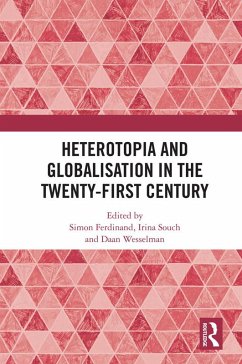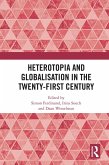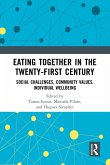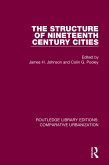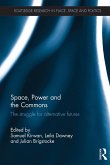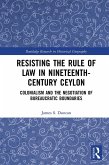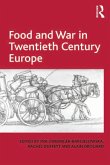Heterotopia and Globalisation in the Twenty-First Century (eBook, ePUB)
Redaktion: Ferdinand, Simon; Wesselman, Daan; Souch, Irina
42,95 €
42,95 €
inkl. MwSt.
Sofort per Download lieferbar

21 °P sammeln
42,95 €
Als Download kaufen

42,95 €
inkl. MwSt.
Sofort per Download lieferbar

21 °P sammeln
Jetzt verschenken
Alle Infos zum eBook verschenken
42,95 €
inkl. MwSt.
Sofort per Download lieferbar
Alle Infos zum eBook verschenken

21 °P sammeln
Heterotopia and Globalisation in the Twenty-First Century (eBook, ePUB)
Redaktion: Ferdinand, Simon; Wesselman, Daan; Souch, Irina
- Format: ePub
- Merkliste
- Auf die Merkliste
- Bewerten Bewerten
- Teilen
- Produkt teilen
- Produkterinnerung
- Produkterinnerung

Bitte loggen Sie sich zunächst in Ihr Kundenkonto ein oder registrieren Sie sich bei
bücher.de, um das eBook-Abo tolino select nutzen zu können.
Hier können Sie sich einloggen
Hier können Sie sich einloggen
Sie sind bereits eingeloggt. Klicken Sie auf 2. tolino select Abo, um fortzufahren.

Bitte loggen Sie sich zunächst in Ihr Kundenkonto ein oder registrieren Sie sich bei bücher.de, um das eBook-Abo tolino select nutzen zu können.
Can heterotopia help us make sense of globalisation? Against simplistic visions that the world is becoming one, Heterotopia and Globalisation in the Twenty-First Century shows how contemporary globalising processes are driven by heterotopian tension and complexities.
- Geräte: eReader
- ohne Kopierschutz
- eBook Hilfe
- Größe: 3.48MB
Andere Kunden interessierten sich auch für
![Heterotopia and Globalisation in the Twenty-First Century (eBook, PDF) Heterotopia and Globalisation in the Twenty-First Century (eBook, PDF)]() Heterotopia and Globalisation in the Twenty-First Century (eBook, PDF)42,95 €
Heterotopia and Globalisation in the Twenty-First Century (eBook, PDF)42,95 €![Globalisation and the Politics of Forgetting (eBook, ePUB) Globalisation and the Politics of Forgetting (eBook, ePUB)]() Globalisation and the Politics of Forgetting (eBook, ePUB)46,95 €
Globalisation and the Politics of Forgetting (eBook, ePUB)46,95 €![Eating Together in the Twenty-first Century (eBook, ePUB) Eating Together in the Twenty-first Century (eBook, ePUB)]() Eating Together in the Twenty-first Century (eBook, ePUB)42,95 €
Eating Together in the Twenty-first Century (eBook, ePUB)42,95 €![The Structure of Nineteenth Century Cities (eBook, ePUB) The Structure of Nineteenth Century Cities (eBook, ePUB)]() The Structure of Nineteenth Century Cities (eBook, ePUB)34,95 €
The Structure of Nineteenth Century Cities (eBook, ePUB)34,95 €![Space, Power and the Commons (eBook, ePUB) Space, Power and the Commons (eBook, ePUB)]() Space, Power and the Commons (eBook, ePUB)43,95 €
Space, Power and the Commons (eBook, ePUB)43,95 €![Resisting the Rule of Law in Nineteenth-Century Ceylon (eBook, ePUB) Resisting the Rule of Law in Nineteenth-Century Ceylon (eBook, ePUB)]() James S. DuncanResisting the Rule of Law in Nineteenth-Century Ceylon (eBook, ePUB)42,95 €
James S. DuncanResisting the Rule of Law in Nineteenth-Century Ceylon (eBook, ePUB)42,95 €![Food and War in Twentieth Century Europe (eBook, ePUB) Food and War in Twentieth Century Europe (eBook, ePUB)]() Rachel DuffettFood and War in Twentieth Century Europe (eBook, ePUB)52,95 €
Rachel DuffettFood and War in Twentieth Century Europe (eBook, ePUB)52,95 €-
-
-
Can heterotopia help us make sense of globalisation? Against simplistic visions that the world is becoming one, Heterotopia and Globalisation in the Twenty-First Century shows how contemporary globalising processes are driven by heterotopian tension and complexities.
Dieser Download kann aus rechtlichen Gründen nur mit Rechnungsadresse in A, B, BG, CY, CZ, D, DK, EW, E, FIN, F, GR, HR, H, IRL, I, LT, L, LR, M, NL, PL, P, R, S, SLO, SK ausgeliefert werden.
Produktdetails
- Produktdetails
- Verlag: Taylor & Francis eBooks
- Seitenzahl: 224
- Erscheinungstermin: 29. Januar 2020
- Englisch
- ISBN-13: 9781000026573
- Artikelnr.: 58583039
- Verlag: Taylor & Francis eBooks
- Seitenzahl: 224
- Erscheinungstermin: 29. Januar 2020
- Englisch
- ISBN-13: 9781000026573
- Artikelnr.: 58583039
- Herstellerkennzeichnung Die Herstellerinformationen sind derzeit nicht verfügbar.
Simon Ferdinand runs English Academic Editing (eaediting.nl). Having received his PhD cum laude from the University of Amsterdam, he is the author of Mapping Beyond Measure: Art, Cartography, and the Space of Global Modernity, and co-editor of Other Globes: Past and Peripheral Imaginations of Globalisation. Irina Souch is Lecturer in the Department of Modern Foreign Languages and Cultures of the University of Amsterdam and Research Fellow at the Amsterdam School of Cultural Analysis (ASCA). She is author of Popular Tropes of Identity in Contemporary Russian Television and Film (Bloomsbury 2017). Her current work addresses narrative, aesthetic, and political functions of landscape in serial television drama and film. Daan Wesselman is Lecturer in Literary and Cultural Analysis at the University of Amsterdam. Always trying to bridge the humanities and urban studies, he focuses particularly on postindustrial urban redevelopment and the material-discursive interfaces between the body, the city, and everyday life.
Editors and Contributors; Acknowledgments; 1. Introduction. Interrupting
Globalisation: Heterotopia in the Twenty-First Century Daan Wesselman,
Irina Souch, and Simon Ferdinand; 2. Other Spaces for the Anthropocene:
Heterotopia as Dis-Closure of the (Un)Common Lieven de Cauter; 3. H is for
Heterotopia: Temporalities of the "New Nature Writing" Cathy Elliott; 4.
Disruptive Elders: Enacting Heterotopias of the Riverbank Mary Gearey; 5.
Agricultural Heterotopia: the Soybean Republic(s) of South America Gladys
Pierpauli and Mariano Turzi; 6. "Interesting and Incompatible
Relationships": Force and Form in Pedro Costa's Porous City Adam Kildare
Cottrel; 7. Heterotopia and Perspective: Towards a Different Imagining of
Landscape Henrietta Simson; 8. Of Tourists and Refugees: The Global Beach
in the Twenty-First Century Ursula Kluwick and Virginia Richter; 9. Airbnb
as an Ephemeral Space: Towards an Analysis of a Digital Heterotopia Elham
Bahmanteymouri and Farzaneh Haghighi; 10. New Communication Technologies
and the Transformations of Space: Lessons from Michel Serres' Thumbelina
Peter Johnson; 11. The Prison as Playground: Global Scripts and Heterotopic
Vertigo in Prison Escape Hanneke Stuit; 12. Dramatic Heterotopia: The
Participatory Spectacle of Burning Man Graham St John; 13. Afterword Kevin
Hetherington; Index
Globalisation: Heterotopia in the Twenty-First Century Daan Wesselman,
Irina Souch, and Simon Ferdinand; 2. Other Spaces for the Anthropocene:
Heterotopia as Dis-Closure of the (Un)Common Lieven de Cauter; 3. H is for
Heterotopia: Temporalities of the "New Nature Writing" Cathy Elliott; 4.
Disruptive Elders: Enacting Heterotopias of the Riverbank Mary Gearey; 5.
Agricultural Heterotopia: the Soybean Republic(s) of South America Gladys
Pierpauli and Mariano Turzi; 6. "Interesting and Incompatible
Relationships": Force and Form in Pedro Costa's Porous City Adam Kildare
Cottrel; 7. Heterotopia and Perspective: Towards a Different Imagining of
Landscape Henrietta Simson; 8. Of Tourists and Refugees: The Global Beach
in the Twenty-First Century Ursula Kluwick and Virginia Richter; 9. Airbnb
as an Ephemeral Space: Towards an Analysis of a Digital Heterotopia Elham
Bahmanteymouri and Farzaneh Haghighi; 10. New Communication Technologies
and the Transformations of Space: Lessons from Michel Serres' Thumbelina
Peter Johnson; 11. The Prison as Playground: Global Scripts and Heterotopic
Vertigo in Prison Escape Hanneke Stuit; 12. Dramatic Heterotopia: The
Participatory Spectacle of Burning Man Graham St John; 13. Afterword Kevin
Hetherington; Index
Editors and Contributors; Acknowledgments; 1. Introduction. Interrupting
Globalisation: Heterotopia in the Twenty-First Century Daan Wesselman,
Irina Souch, and Simon Ferdinand; 2. Other Spaces for the Anthropocene:
Heterotopia as Dis-Closure of the (Un)Common Lieven de Cauter; 3. H is for
Heterotopia: Temporalities of the "New Nature Writing" Cathy Elliott; 4.
Disruptive Elders: Enacting Heterotopias of the Riverbank Mary Gearey; 5.
Agricultural Heterotopia: the Soybean Republic(s) of South America Gladys
Pierpauli and Mariano Turzi; 6. "Interesting and Incompatible
Relationships": Force and Form in Pedro Costa's Porous City Adam Kildare
Cottrel; 7. Heterotopia and Perspective: Towards a Different Imagining of
Landscape Henrietta Simson; 8. Of Tourists and Refugees: The Global Beach
in the Twenty-First Century Ursula Kluwick and Virginia Richter; 9. Airbnb
as an Ephemeral Space: Towards an Analysis of a Digital Heterotopia Elham
Bahmanteymouri and Farzaneh Haghighi; 10. New Communication Technologies
and the Transformations of Space: Lessons from Michel Serres' Thumbelina
Peter Johnson; 11. The Prison as Playground: Global Scripts and Heterotopic
Vertigo in Prison Escape Hanneke Stuit; 12. Dramatic Heterotopia: The
Participatory Spectacle of Burning Man Graham St John; 13. Afterword Kevin
Hetherington; Index
Globalisation: Heterotopia in the Twenty-First Century Daan Wesselman,
Irina Souch, and Simon Ferdinand; 2. Other Spaces for the Anthropocene:
Heterotopia as Dis-Closure of the (Un)Common Lieven de Cauter; 3. H is for
Heterotopia: Temporalities of the "New Nature Writing" Cathy Elliott; 4.
Disruptive Elders: Enacting Heterotopias of the Riverbank Mary Gearey; 5.
Agricultural Heterotopia: the Soybean Republic(s) of South America Gladys
Pierpauli and Mariano Turzi; 6. "Interesting and Incompatible
Relationships": Force and Form in Pedro Costa's Porous City Adam Kildare
Cottrel; 7. Heterotopia and Perspective: Towards a Different Imagining of
Landscape Henrietta Simson; 8. Of Tourists and Refugees: The Global Beach
in the Twenty-First Century Ursula Kluwick and Virginia Richter; 9. Airbnb
as an Ephemeral Space: Towards an Analysis of a Digital Heterotopia Elham
Bahmanteymouri and Farzaneh Haghighi; 10. New Communication Technologies
and the Transformations of Space: Lessons from Michel Serres' Thumbelina
Peter Johnson; 11. The Prison as Playground: Global Scripts and Heterotopic
Vertigo in Prison Escape Hanneke Stuit; 12. Dramatic Heterotopia: The
Participatory Spectacle of Burning Man Graham St John; 13. Afterword Kevin
Hetherington; Index
